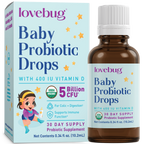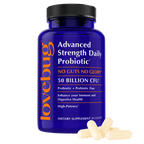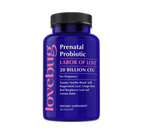Probiotics are living bacteria that offer health benefits for children and adults alike. These microorganisms are naturally found in yogurts and fermented food, and are often consumed as supplements. The main job of stomach bacteria is to promote good gut health by maintaining a balance between the good and the bad bacteria. Including probiotic supplements in your child’s diet ensures that he or she enjoys several health benefits ranging from a stronger immune system and enhanced digestion to brain development.
Probiotics for babies and children play a key role in your child’s growing development. Let’s take a look at a handful of ways that probiotics can impact your child’s gut health and whole body wellness.
Immunity support
More than 70% of your child’s immune system is located in their gut. Therefore, a regular diet that includes probiotics helps fortify your child’s immune system. The gastrointestinal tract of your child becomes healthier and more capable of fighting common colds and illnesses such as strep throat.
Weight control
The growth of good bacteria in the gut is extremely vital to your child’s digestion. These bacteria not only aid in metabolism, but also help in the absorption of nutrients into their body. Research has also linked the amount of good bacteria in the gut to weight management. Having a diverse amount of microbes in the gut can help children maintain a healthy weight.
Diarrhea
Probiotics for babies and children aid in the treatment of diarrhea by reducing its severity. A report published in a pediatrics medical journal indicated that the probiotic Lactobacillus was effective in the treatment of infectious diarrhea in children. The study also found that for those children who were suffering from acute viral gastroenteritis, probiotics provided relief one day sooner than those who were not given probiotics.
Another study conducted in Mexico found that children who consumed probiotics for a period of 3 months had decreased incidences of diarrhea compared to those who took a placebo.
Brain development
Babies get their gastrointestinal bacteria (good as well as bad) from their mothers during pregnancy. When mothers-to-be are taking probiotic supplements, they will inevitably pass on these good bacteria to their babies. If bad bacteria are found in abundance in your child’s gut, it can increase the risk of an array of issues from ADD all the way to diabetes. The best way to support the brain development of your children is to include a probiotic in their diet. Whether through natural foods or probiotic supplements, ensuring your child’s body is absorbing nutrients from the foods she consumes is vital to supporting proper brain development.
Necrotizing enterocolitis (NEC)
Necrotizing enterocolitis (NEC) is a serious condition that mainly affects premature babies. In this disease, the intestinal tissue becomes damaged, so much so that it starts to die. Bloody stools, diarrhea, bloating, and abdominal swelling are some of the common symptoms of this disease. Probiotics can actually reduce the risk of developing NEC in premature babies. As per a study conducted in Australia, probiotics reduced the chances of NEC by nearly 30%.
Facing food allergies
The first bacteria that a baby is exposed to has an open ground to flourish. This is the reason why it is extremely important for mothers-to-be to consume probiotics during pregnancy. These first bacterial exposures will help lay the foundation of their immune system and will teach your baby's immune system whether to identify foods as foreign substances and attack them. If your baby has a robust healthy makeup of gut bacteria it will help in preventing food allergies.
Intestinal support
Many probiotic supplements have strains that not only reduce the severity of several intestinal problems, but can also help prevent them. Intestinal problems in children that can be relieved by consuming probiotics include bloating, gas, cramping, diarrhea, and abdominal pain. Probiotics for children provide relief because they support your digestive tract by functioning effectively, which in turn means smoother bowel movements.
Healthy skin
Research has indicated that a higher density of good gut bacteria in infants reduces their risk of developing allergies, colic, diabetes, and eczema. A regular intake of baby probiotics can reduce the likelihood of developing skin problems such as atopic eczema. This is because probiotics help by increasing the amount of good bacteria in the gut, which as mentioned above sets the tone for overall immunity.
Next Steps
It's recommended that children take probiotics as early as possible in order to promote a healthy and balanced gut. By the time a child reaches the age of three, their microbiome already closely resembles that of a totally grown person. Setting the foundation of a healthy, balanced gut can affect their health during childhood, and for years to come.
It's important to remember that probiotics are not a primary medical treatment. Probiotics for babies and kids should only be used as supplements alongside the treatment plan prescribed by your child’s pediatrician.
References
Ahmadi, E., Alizadeh-Navaei, R., & Rezai, M. S. (2015). Efficacy of probiotic use in acute rotavirus diarrhea in children: A systematic review and meta-analysis. Caspian Journal of Internal Medicine, 6(4), 187–195.
Cruchet, S., Furnes, R., Maruy, A., Hebel, E., Palacios, J., Medina, F., … Zablah, R. A. (2015). The Use of Probiotics in Pediatric Gastroenterology: A Review of the Literature and Recommendations by Latin-American Experts. Paediatric Drugs, 17(3), 199–216. http://doi.org/10.1007/s40272-015-0124-6
Mulle, J. G., Sharp, W. G., & Cubells, J. F. (2013). The Gut Microbiome: A New Frontier in Autism Research. Current Psychiatry Reports, 15(2), 337. http://doi.org/10.1007/s11920-012-0337-0
Slattery, J., MacFabe, D. F., & Frye, R. E. (2016). The Significance of the Enteric Microbiome on the Development of Childhood Disease: A Review of Prebiotic and Probiotic Therapies in Disorders of Childhood. Clinical Medicine Insights. Pediatrics, 10, 91–107. http://doi.org/10.4137/CMPed.S38338
Sampson, T. R., & Mazmanian, S. K. (2015). Control of Brain Development, Function, and Behavior by the Microbiome. Cell Host & Microbe, 17(5), 565–576. http://doi.org/10.1016/j.chom.2015.04.011
Sawh, S. C., Deshpande, S., Jansen, S., Reynaert, C. J., & Jones, P. M. (2016). Prevention of necrotizing enterocolitis with probiotics: a systematic review and meta-analysis. PeerJ, 4, e2429. http://doi.org/10.7717/peerj.2429
Vighi, G., Marcucci, F., Sensi, L., Di Cara, G., & Frati, F. (2008). Allergy and the gastrointestinal system. Clinical and Experimental Immunology, 153(Suppl 1), 3–6. http://doi.org/10.1111/j.1365-2249.2008.03713.x

























